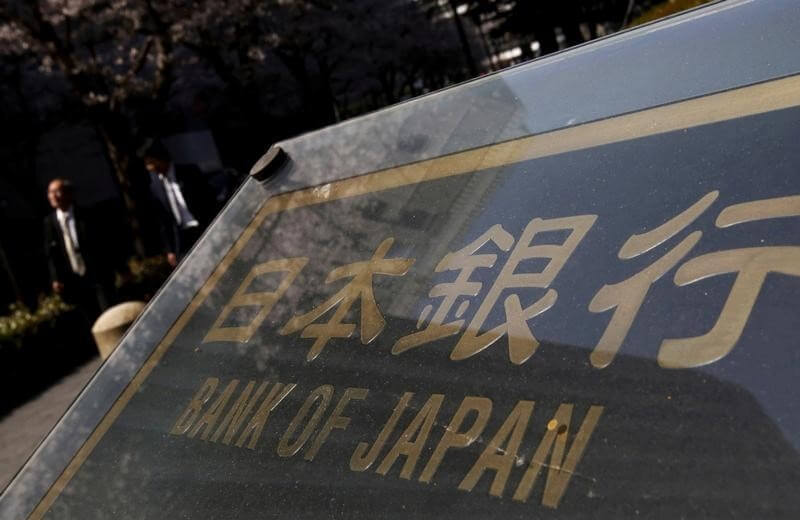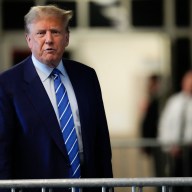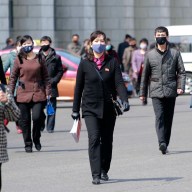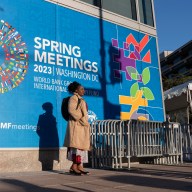By Kaori Kaneko and Sumanta Dey
TOKYO/BENGALURU (Reuters) – The Bank of Japan is set to skip a chance to ease policy further at next week’s meeting, but will do so in July through a combination of measures in yet another attempt to drive up anemic inflation, a Reuters poll found. Japan core consumer inflation, which strips out volatile fresh food costs, fell for a second straight month in April raising fears of a relapse into deflation and pressuring the BOJ to do more to hit its ambitious 2 percent inflation target. Eighteen of 27 economists polled over the past week said the BOJ would ease its ultra-loose monetary policy at the end of its meeting on July 28-29, when it is due to release its latest forecasts for inflation and economic growth. Five said it would act next week while two picked the policy review on Oct 31-Nov 1. One selected the September meeting and another one picked sometime in 2017.
“If the yen rises further and worries about an adverse impact on the economy and prices from a strong yen mount, the BOJ will ease policy,” said Takeshi Minami, chief economist at Norinchukin Research Institute. Almost three-fourths of economists who answered an extra question said the BOJ will ease through a combination of some of the steps such as a deeper cut into negative rates, currently at -0.1 percent, and boosting asset buying including exchange-traded funds (ETF) and corporate bonds. The others said it would take either one of those measures.
The BOJ cut its benchmark interest rate below zero at the start of the year, hoping it would push banks to lend money to businesses and consumers instead of hoarding it, which in turn should help boost demand and ultimately inflation. The reaction to negative rates has hardly been pleasant, with the Japanese yen rallying since the move and threatening the country’s massive export industries.
In one of the clearest signs yet that banks are shifting away from the market due to negative rates, Mitsubishi UFJ Financial Group said this week that it may withdraw as a primary dealer for Japanese government bonds. Still, economists in the poll expect a further cut in the interest rate to -0.2 percent in the third quarter.
The BOJ’s efforts form part of Prime Minister Shinzo Abe’s “Abenomics” program of massive fiscal spending and structural reforms.
But apart from infrequent months of rising prices, there are few signs of the economy picking up enough momentum to generate decent inflation.
Abe last week postponed a scheduled sales tax hike in April 2017 by 2-1/2 years, mindful of the weak economy and on concerns that it could tip back into recession, as it did when the tax was raised to 8 percent from 5 percent in 2014. Three-fourths of economists who replied to another question in the poll said they support his decision, though there are also concerns about Japan’s fiscal health.
Asked about the size of an expected supplementary budget, after Abe announced he would deploy such a package this autumn, a majority in the survey said it would be between 5-10 trillion yen($46.68 billion-$93.35 billion). After the premier’s decision to postpone the tax hike, economists revised up their growth projection for next fiscal year.
The economy is seen expanding an annualised 0.8 percent for fiscal 2017, up from the flat reading expected last month, according to the poll taken before Wednesday’s revised growth data for the first quarter It will grow 0.7 percent this fiscal year to March 2017, compared with a 0.8 percent projection made last month.
Japan’s core consumer price index, will probably rise 0.1 percent in this fiscal year to March 2017 and then pick up pace to 0.9 percent next fiscal year, the poll showed, little changed from last month. (Reporting by Kaori Kaneko, writing by Sumanta Dey; Polling by Shaloo Shrivastava; Editing by Ross Finley & Shri Navaratnam)
BOJ seen standing pat in June, but easing further in July to meet price goal: Poll

By Kaori Kaneko and Sumanta Dey











